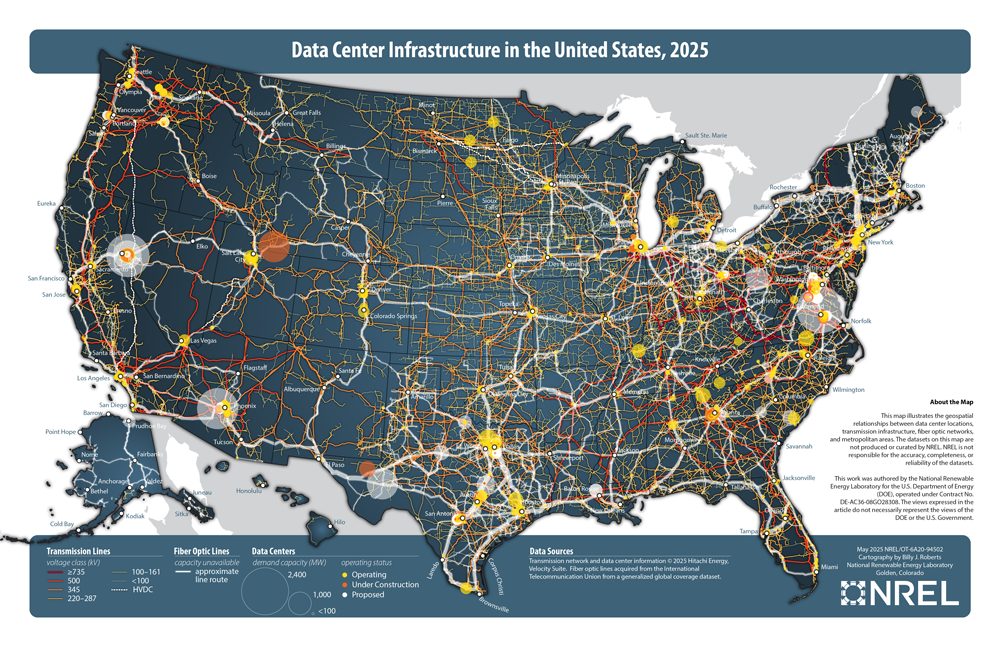by Christopher D. Lloyd,
McGuireWoods Consulting
From navigation to investing to shopping, data centers are now the backbone of nearly every transaction in the modern economy. The recent explosion in AI capabilities and the coming data needs of autonomous vehicles and other new information-driven frontiers mean that the need for more data centers will only continue to escalate.
Data center facilities represent incredible economic development opportunities for communities large and small. Not only do they support high-wage jobs but, of particular importance to cash-starved governments with citizens upset about higher property valuations, they generate significant new tax revenue to support education, public safety, parks and other essential government services.
Beginning in 2008 with Virginia’s pioneering sales and use tax exemption for data center equipment, dozens of states now afford similar savings to encourage the development of these facilities. With the world moving toward more IT utilization, these exemptions nearly mimic the long-standing exemption that most states already afforded for manufacturing equipment used to make final products which are then subject to the sales tax.
Despite calls by some to slow down the growth of the data center industry during the past several months by rolling back incentives or putting various permitting barriers in the way of their development, several additional states have added or enhanced their data center incentives to capture this growing market.
Michigan
In January, Michigan Governor Gretchen Whitmer signed legislation extending that state’s sales and use tax exemption until 2050, sending a strong signal to the marketplace of the Great Lakes State’s support for this burgeoning industry. For data centers developed on brownfield or former power plant sites, the exemption can extend to 2065. Michigan’s extended benefit is tied to these facilities meeting energy efficiency and water conservation targets. In order to qualify, the data center must commit to invest at least $250 million and create at least 30 jobs which pay 150% of the median wage for the region where the facility will be located.
With the extended sales tax exemption, however, data center operators could forgo local property tax abatements unless approved by the adoption of a specific resolution by the local governing body. Further, data center operators cannot tap long-term industrial load rates or economic development tariff rates approved by the state utility regulator.
Kansas
Kansas had long been one of the few states with no data center sales and use tax exemption but joined the club in April with the adoption of a wide-ranging program. The new law provides the exemption for data centers representing a total capital investment of more than $250 million and that will create at least 20 new full-time jobs — both to be achieved within a 5-year period. Such thresholds reflect the increasing investment in technology to drive these facilities and may afford the state a competitive advantage over others. Once approved, a data center is eligible for the exemption for 20 years — a time frame that should carry a facility through several equipment refresh cycles.
Where the Kansas law plows new ground is by creating a policy framework to address some of the most common public concerns about data centers. Specifically, the law expresses a commitment that power to serve a data center facility should come from a public utility (which discourages behind-the-meter power solutions), and the data center operator should be looking at water-saving technologies such as reuse and other conservation technologies.
Given growing concerns about the role of identified foreign adversaries and access to sensitive data, the law also requires that the Secretary of Commerce seek the approval of the state’s fusion center task force, a group that oversees cybersecurity and other anti-terrorism activities, prior to granting a tax exemption.
West Virginia
West Virginia’s newly enacted “Power Generation and Consumption Act” builds upon the state’s already favorable tax climate for data centers by removing potential barriers to development of designated high-impact data centers. Such facilities are defined as those coming online after July 1, 2025, and requiring more than 90 megawatts of power. Once the state’s commerce secretary makes such a designation, the data center is freed from many potential land use restrictions at the local level that have slowed data center development in other states. The designation also allows the center to be eligible to receive favorable valuation for property tax purposes.
In a new take to highlight to a public sometimes skeptical about the fiscal benefits from data center development, the property tax revenues generated by high-impact data centers are then set aside for a Personal Income Tax Reduction Fund administered by the state. (For more on West Virginia’s new policy, see Ron Starner’s West Virginia Spotlight on p. 140 of this issue.)
Despite some opposition to the growth of the data center industry, it is an emerging sector which can benefit communities both large and small. Data centers essential to the functioning of the global economy. By reducing the operating costs and making it easier to develop such facilities, the benefits of these projects can be accelerated and more widespread.

Christopher D. Lloyd
Director of Infrastructure & Economic Development at McGuireWoods Consulting LLC
